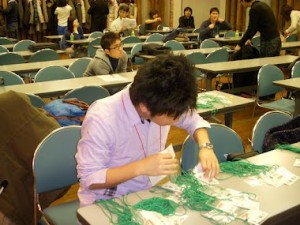みなさまこんにちは。
2月18日(土)に開催されたworkshopの報告をさせていただきます。

(休憩時の様子です)
《 今回のworkshop 》
○workshop参加人数:76名(うち新人の方:10名)
○【前半】:ゲーム「英語でNGワードゲーム」
○【後半】:[Agenda] How should we do to deal with the climate change?
○【workshop後】大学講師の方からの依頼による、アンケート調査を行いました。
*************************************************************
今回は淀屋橋近辺の会場を使用しました。
このところ職場や学校でも、インフルエンザに罹患された方が多いのでは
ないでしょうか。
E’s clubでも今回はworkshopの直前にインフルエンザや風邪になって
お休みされている方もいらっしゃったようです。
みなさんお体お大事になさってくださいね。

(今回名札配布担当、Nさんです!いつも盛り上げていただいてTnks!)
○【前半】:ゲーム「英語でNGワードゲーム」
今回のfirst halfは若手スタッフのTさんに作成していただきました。
通信企業にお勤めのTさん。お仕事もかなりお忙しいようで、
materialの作成と、ご出張の時期が重なってしまい、
さらにお忙しくさせてしまってゴメンなさいね~。
そんな中作成していただいた、「NGワードゲーム」!
メンバーにも大変好評でした!
3:3に分かれて、3人ずつになって考えたNGワードを
相手チームに言わせるゲーム。
「なんとか言わせたい!」という思いと
「向こうが考えてくるNGワードはこれか?!」
と2チームのせめぎ合いが、周りから見ていても
とても楽しそうでした。
Tさんお忙しい中作成をありがとうございました!

(みんなが書いたNGカードですね~)
○【後半】:[Agenda] How should we do to deal with the climate change?
latter halfは幹事で、大学研究員のKさんに作成していただきました。
気候変動、地球温暖化に関するニュースや報道は、
ここ数年多く目にするようになりました。
ただ、それらの問題に対して、我々自身が
「これらの問題はだれの責任なのか?」
「私たちはこれらの問題に対して、どのように対処すべきなのか」
ということを、身近な人同士で話すことはあまりないかもしれません。
E’s clubでは後半に社会問題のディスカッションをしておりますが、
このところ、新人の方を含む多くのメンバーが、このような
タフなissueに関して、しっかりと予習をされて挑まれています。
予習なしで、予想していなかったことに対して臨機応変に対応できる
英語力も大切ですが、このような社会問題に関しては
ベースとなる知識をある程度学んで、ディスカッションに
取り組まれると、議論の深さ、面白さが全く違います。
Kさんのご専攻は哲学ということで、
materialは、私たちにも取り組める範囲の難易度のものを
選んでいただいていますが、いつも深く考えさせられる
テーマが多く、とても興味深いですね。
過去2、3度作成していただいておりますので、
ご興味のある方は、ウェブサイト「開催報告」
の履歴をご覧ください。
○【workshop後】大学講師の方からの依頼によるアンケート調査
幹事の知人である大学講師から依頼がありまして、
今回研究のためのアンケート調査に協力することになりました。
調査のテーマは
『大学生が考える英語能力及び、社会で必要な英語能力とはいったいどういうものなのか』
というものでした。
依頼者の方は大学で、英語教育に関する研究をされているということで、
今回の調査結果ならびに考察について、
後日ワークショップでプレゼンテーションを行ってもらい、
またそのテーマに関連したディスカッションも行う予定です。
このディスカッションがあるworkshopは非常に盛り上がりそうですね。
楽しみです。
それでは参加者にお送りした案内メールをご覧ください。
***************************************************
<英語サークル E’s club 第32回workshopのご案内>
みなさまこんにちは、E’s club幹事のKです。第32回workshopの詳細をお送りいたします。
今回のマテリアルは前半をTさんに作成していただき、後半をKが作成しました。
前半はNGワードを言わないようにディスカッションするゲームを行います。後半は「気候変動」をテーマとしたディスカッションです。
[今週のマテリアル]
<first half>
今回のfirst halfはTさんに作成していただきました。
内容は、6人のテーブルを2チーム(3人ずつ)に分けて、相手チームが決めたNGワードを言わないようにディスカッションするゲームです。
詳しい説明はこちらです↓
(1)
6人のテーブルをつくる
Make a table of 6 persons.
(2)
6人テーブルを2チームに分ける
Divide your table (6 persons) into 2 teams (3 persons×2 teams).
(3)
6人テーブル全員で、話し合うテーマを一つ決める。下記のテーマ例以外のテーマでもOK。
Choose one topic to discuss with in your table (6 persons).
Not necessarily have to choose a topic from examples below.
・英語を学ぶ上で重要なことは何か
*Important factor to learn English
・旅行中に遭遇したちょっと危なかったこと
*The dangers you have passed through during the travel
・最近気になっていること
*the things you are thinking a lot recently
・私の財テク
*the techniques of saving money
・次の夏休みの予定
*the plan of your next summer vacation
・好きな映画について
*favorite movies
・今だから話せる失敗談
*failure story
・使い切れないほどお金があったら何をしますか
*What if you have more money than one will ever use?
…etc
(4)
ディスカッションを始める前に、3人のチームごとで話し合って、相手チームのNGワードを5つずつ決めてください。
ただし、NGワードは名詞(代名詞は不可)でなければなりません。
Before starting discussion, have an internal talk in your team (3 persons) and decide the 5 “NG” words of opposing team.
Please note that these 5 “NG” words have to be nouns (not pronouns).
(5)
6人テーブル、3対3で、一つのテーマにつき、10分間のディスカッションをしてください。
10分後ゲーム終了時に、相手チームに自分のチームより多くのNGワードを言わせたら勝ちです。
相手チームがNGワードを口にしたときは、「それNGワードです!」とその都度教えてあげてください。
10分経つ前に、どちらかのチームが5つ言いきってしまったら、NGワード関係なくディスを続けてもいいですし、チャットしていただいてもいいで すし、自由にお過ごしください。
Have a ten-minute discussion per one theme in a table of 6 person, 3 on 3.
The team wins the game by making the opposing team members say more NG words than your team.
Please indicate when some opposing team member says one of NG words on the spot.
If the game finishes by saying all the NG words, you can keep discussing the theme regardless of NG words, have a chat, or relax.
(6)
10分間のディスカッションが終わったら、(3)~(5)を繰り返し行ってください。
After a ten-minute discussion, please repeat (3)~(5).
<このゲームのポイント>
「自分たちで設定したNGワードを相手に言わせるように、いかに誘導するか」という点です。
また一方で、「相手がどのワードを言わせようと誘導しているのか」というのを見極めて、そのワードは言わないようにする、という駆け引きも重要な ポイントになります。
<latter half>
Kです。後半では気候変動を扱います。
マテリアルは”Open2.net”というサイトの”Ethics Bites”というシリーズもののインタビューの一部です。
以下はインタビューの中で、設問に直接関係する部分のみを抜き出したものです。
ご興味のある方は下のページにインタビューの全文と音声ファイルがあるので、読んで(聞いて)みてください。
http://www.open.edu/openlearn/history-the-arts/culture/philosophy/climate-change
気候変動問題の難しい点は、原因を作った人と被害を受ける人が必ずしも一致しないところです。
現在の経済活動の結果生じる気候変動は、現在生きている我々のみではなく、後の世代にも影響を与えます。
ですが、「後の世代のために我々は何かを犠牲にせねばならない」という主張を根拠づけるのは、そう簡単なことではありません。
「なぜ」「いま」「我々に」気候変動を抑制するための対策を取る責任があるのか?
一見当たり前のことのように思われるかもしれませんが、改めてもう一度問い直してみると、新たな発見があるかもしれません。
[Agenda]
<How should we do to deal with the climate change?>
[Questions]
1. In what point are you anxious about the global climate change?
2. Who do you think most severely suffer from the global climate change?
And who do you think are responsible for it?
3. Do you agree with the restriction of the economic growth to reduce the emission of greenhouse effect gas? And why?
4. Do you agree with the restriction of the number of children to reduce the population? And why?
5. Do you think there should be sanctions for the countries that particularly damage the environment? And why?
6. How do you think Japan should do to deal with the climate change? And why?
Climate Change (An excerpt from the website below)
By: Dr James Garvey
Ethics Bites on Open2.net
http://www.open.edu/openlearn/history-the-arts/culture/philosophy/climate-change
Nigel: The topic we’re focusing on today is ethics and climate change. I know you’re not a scientist but you have done a lot of research into the effects of climate change; I wonder if you can sketch what’s going to happen unless we take very serious action.
James: Well the Intergovernmental Panel on Climate Change has done a lot of surveys of the literature and they give us a range of 1.1 to 6.4 degrees Celsius as the amount of warming we can expect in the next century. The bottom end of that is associated with a world in which we don’t emit another whisper of carbon dioxide. The changes that are already underway are things like retreat of snow cover. That’s worrying because 1/6th of the population gets its water from melting snow and ice. Hot extremes will become more frequent. Typhoons and hurricanes will become more intense. Precipitation will change throughout the world – places that are already wet will become more so, and there’ll be more flooding. Places that are dry will experience more drought. There’s a possibility of worse to come; things like the gulf-stream could shut down in the future if things carry on as they are. And also of course the sea level will rise. If you think in terms of plants and animals, something like 15% to 37% of plants and animals will be locked into extinction by 2050. We’re living through the 6th major extinction our planet has experienced. The last one did in the dinosaurs. In 2003, 35,000 people died as a result of just heat in Europe, so the heat alone can kill us. And it’s also true that as the sea level rises, peoples’ lives will have to change: half the people on the planet currently live on the coast.
Nigel: So that’s a pretty grim forecast. What are the ethical issues for us?
James: There’s a lot of unnecessary suffering ahead if we don’t make certain choices now. And I suppose that’s as moral as anything – avoiding human suffering.
Nigel: But I could respond to that, I’m not likely to be the one who’s going to suffer – why should I care about future generations?
James: Whatever else morality is, it involves sometimes putting the needs of other people before one’s own. And it’s true that one of the strange facts about climate change is that it involves generations now cutting back and making sacrifices for people who aren’t yet born. But every day hopefully, if you’re a good person, you’ll make sacrifices for people who are right in front of you – and there’s not much of a moral difference between someone right in front of you and somebody on the other side of the world when it comes to a moral decision. And similarly there’s not much morally relevant difference between someone alive today and someone alive in 100 years.
(omission)
Nigel: And you don’t think that the fact that these harms take place in the future is irrelevant. You think there’s a strong moral reason to sacrifice growth today for the sake of future generations?
James: I think there is. I’m convinced that spatial distance is morally irrelevant when it comes to doing what’s right. So the philosopher Peter Singer famously argues that if you’re walking past a child who’s drowning you ought to wade in even at some cost to yourself, even if it means getting your clothes a bit muddy you ought to do it. And the fact that there’s a child in Africa, the fact that that child is some distance away is not relevant to the obligation you have to doing something even if you’re inconvenienced in some way. And I’m inclined to think that temporal distance doesn’t matter much either. That whether the child is alive today or in a year, I think you still have to have some obligations towards that child.
Nigel: For most of us going green could be seen as a kind of self-deception about climate change. I put my bottles in the recycling unit, I switch the odd light off, I take the bus instead of driving by car occasionally, or I buy a bicycle; now that’s not going to make very much difference to the planet, surely.
James: That’s true. One of the hardest things to get past when you’re thinking about climate change is the thought that your own actions have no relevant consequences or no big consequences. The way I get past it is that I think the United States, for example, is the biggest contributor to climate change, maybe 4% of the population of the planet is responsible for 25% of emissions, but yet it does nothing about climate change. I also think it’s got the most room to reduce – the most luxury emissions – so it’s got more room to reduce than others. And you can feel moral outrage at that.
It’s possible to think about your own life and to recognize that say an American is responsible for a lot more per capita than somebody from Uganda and think that they ought to be doing a lot more – so in my own life my own per capita emissions are much higher than the average person on the planet’s emissions. And I can feel a kind of moral outrage at that, just as I do at America. I can think that I’ve got a lot more room to reduce my emissions just as America does. Though it’s not the same magnitude of harm that I do, it’s still harm and it’s still wrong.
(omission)
Nigel: The best way to stop carbon emissions is to reduce the population. Are you going to go that far and say we ought to impose restrictions on the number of children that people can have?
James: I do think it’s true that there are probably too many people on the planet using too many resources. It’s difficult to get away from that conclusion. It’s a horrible thought that the right thing to do is to place restrictions on human beings. Because a lot of human happiness has to do with children, and raising children. I’m not sure I’m willing to say that there ought to be legislation or that people’s lives should be interfered with to that extent.
(omission)
Nigel: Is history the only thing relevant to the question of responsibility here?
James: Our values grew up in very small tribal groups, so we’re very good at spotting rights and wrongs locally. If somebody shoplifts a bottle of tequila you can tell immediately that something’s wrong there. It’s much more difficult to think we got up this morning and we had toast and tea and coffee and we’ve been doing that for some time and we drive to work and we have hot showers in the morning, and everything. And putting all of those millions of little events together over time and saying you’re then somehow responsible for the sea level increasing in China in 100 years and the deaths of people that result from that is a difficult thing to approach. You can, though, approach responsibility from three directions.
One of them is history. The fact that certain countries have a longer and larger history of industrialization and therefore have put more of the stuff in the atmosphere and therefore are responsible for more of the damage.
You can also think about the present. Present entitlements, or capacities. Ignoring the history of climate change you can just think well now it’s quite disproportionate the uses of our carbon sinks. Maybe, therefore, there’s a responsibility for those who use more to cut back a bit. You can also think about present capacities. For example, some countries have more luxury emissions than subsistence emissions, so it’s easier for them to make cuts. They also might have a better infrastructure – maybe they’re a superpower and they have the brains and the money to make cuts.
And you can finally think about the future. And you can think that every developing or developed nation has a responsibility to do something to ensure that the future is a reasonable place for people to live in.
Nigel: And what about sanctions, do you think there should be sanctions as a way of shaping the behaviour of those countries that are particularly damaging to the environment?
James: Absolutely. As Hobbes said, covenants without the sword are but words. And if sanctions were the right thing to do to South Africa under apartheid, certainly they were the right thing to do because South Africa was harming its own people. And those who refused to take actions on climate change are harming more than just their own people, but the people all over the world – and no doubt it’s the most poor who will be the most affected who will be the least likely to be able to do something. So I think sanctions are warranted yes. I also think that collective action or civil disobedience on the part of people within a country are justified as well.